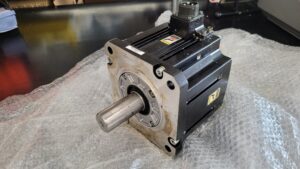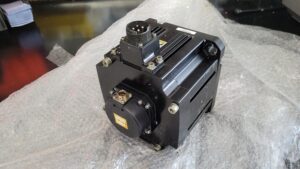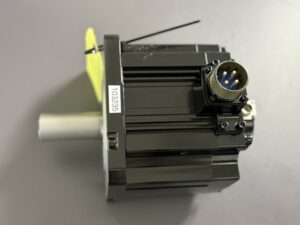09.06.2025 by Viktor Siebert
Repair of a Mitsubishi AC Servo Motor HF303S-A48
We recently had a Mitsubishi AC Servo Motor HF303S-A48 in our workshop for repair. The motor arrived with an obvious ball bearing failure. However, initial tests indicated that both insulation and other electrical values were within the normal range.
Diagnosis and Challenge
During our initial diagnosis, we found that the encoder showed no abnormalities. However, the motor was mechanically stiff, and especially at higher speeds, it generated excessive noise. The noise was so loud that we fully understood the customer’s complaints: his employee frequently suffered headaches due to the loudness of the machine.
The customer had previously attempted to procure a replacement motor. Unfortunately, the newly purchased motor did not fit because the installed encoder was programmed differently. This mismatch caused the drive to report an error, leaving the machine non-operational. This issue arises when motors are equipped with encoders specifically programmed for their respective motors. If the pulse count or encoder specification does not exactly match the drive, the system rejects the motor.
Repair Process
After the customer contacted us through a recommendation, we opted for a thorough and swift repair. We successfully repaired the motor within one week. Since the encoder was technically flawless, it only required cleaning rather than replacement.
Additionally, the motor had sustained minor transport damage, resulting in a broken power connector, which we also replaced. Upon completion of the repair work, the motor looked like new and was fully functional.
Our Repair Procedure
Our detailed repair process includes the following steps:
- Initial inspection: Visual inspection, measurement of electrical values, mechanical assessment.
- Disassembly and cleaning: Complete disassembly of the motor, thorough cleaning of all parts.
- Fault analysis: Inspection of components for damage or wear, particularly the encoder, bearings, and windings.
- Replacement of defective parts: Replacement of damaged or worn components.
- Preventive maintenance: Replacement of parts known from experience to potentially cause future issues.
- Final assembly and tests: Motor reassembly, comprehensive tests to ensure full functionality and performance.
Outcome
The motor is now reinstalled in the machine, running exceptionally quietly and appearing practically new. The encoder installed is a Mitsubishi OBA18-100, and the motor operates flawlessly in conjunction with the Mitsubishi Drive model MDS-D2-V-80.
Our Appeal to You
If you are experiencing problems with your Mitsubishi AC Servo Motor or similar devices, do not hesitate to contact us. Avoid unnecessary experiments and benefit from quick, reliable, and cost-effective repairs carried out by our experienced specialists.





To mentioned Mitsubishi Motor: Mitsubishi AC Servo Motor HF303S-A48
More details about our Mitsubishi repair services can be found here:
Mitsubishi motor Repair by Industrypart
📞 Feel free to contact us with any questions about your Mitsubishi drive technology.
Our expert team is happy to help!
Technical Specifications (HF303S-A48)
| Feature | Value |
|---|
| Compatible Servo Drive Unit | MDS-D2-V-80 |
| Rated Output | 3.0 kW |
| Rated Current | 10.7 A |
| Rated Torque | 14.3 Nm |
| Stall Current | 15.8 A |
| Stall Torque | 22.5 Nm |
| Maximum Rotation Speed | 3000 rpm |
| Rated Rotation Speed | 2000 rpm |
| Maximum Current | 48.0 A |
| Maximum Torque | 64.0 Nm |
| Power Facility Capacity | 5.5 kVA |
| Motor Inertia (without/with brake) | 75.0 kg·cm² / 84.7 kg·cm² |
| Encoder Resolution | 260,000 pulses/rev (A48) |
| Flange Size | 176 mm square |
| Total Length (excluding shaft) | 183.5 mm |
| Flange Fitting Diameter | ø114.3 mm |
| Shaft Diameter | ø35 mm |
| Weight (without/with brake) | 19.0 kg / 25.0 kg |
| Ambient Temperature | Operation: 0 to 40°C, Storage: -15 to 70°C |
| Protection Class | IP67 (excluding shaft area) |
| Vibration | X: 24.5 m/s², Y: 29.4 m/s² |
Alarm Codes and Troubleshooting
| Alarm Code | Description | Cause | Recommended Actions |
|---|
| AL.10 | Undervoltage | Input voltage too low | Check voltage and wiring, ensure proper power source |
| AL.16 | Encoder Error | Faulty encoder or wiring | Check encoder and wiring; replace if necessary |
| AL.20 | Overcurrent | Short circuit, motor blockage, or overload | Check motor mechanically, inspect wiring for shorts |
| AL.30 | Overload | Mechanical overload or stiff motor | Reduce mechanical load, check bearings and drive components |
| AL.32 | Motor Overheat | Insufficient cooling or contamination | Reduce ambient temperature, inspect cooling and ventilation, clean motor |